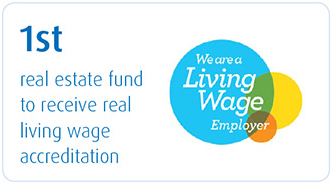BMO UK Property Fund Leads on Living Wage Accreditation
21 January 2020BMO UK Property Fund Leads on Living Wage Accreditation
21 January 2020BMO Real Estate Partners has successfully piloted the payment of real living wages across its BMO UK Property Fund, ensuring that all employees of third-party contractors are paid at least the real living wage. Building on this achievement, the Company is now targeting Living Wage accreditation across its other funds, engaging with property teams, contractors, occupiers and investors. Following accreditation in May 2018, the BMO UK Property Fund has also looked to encourage new occupiers to pay real living wages, with 46% of leases signed in 2019 containing living wage clauses, reflecting occupier support.
Key Facts
- Leadership on an important social issue
- Making a difference in people’s lives
- Engaged and motivated local teams
Situation
Managed by BMO Real Estate Partners, the BMO UK Property Fund comprises office, industrial, retail and leisure properties. In 2018, it became the first real estate fund to be accredited by the Living Wage Foundation, ensuring that employees of all properties and third-party contractors in scope are paid the real living wage. The real living wage is calculated by the Living Wage Foundation based on how much people need to live in a given area and goes beyond the Government’s minimum wage and national living wage.
Key drivers for the BMO UK Property Fund seeking Living Wage accreditation included rising investor interest in Environmental, Social and Governance (ESG) matters. During events and meetings with investors, the Fund Manager heard first-hand of their desire to generate social good through their investments. Living Wage accreditation also supports BMO Real Estate Partners’ broader commitment to responsible investment, reflected in its participation in the Global Real Estate Sustainability Benchmark (GRESB) since 2015.
Actions
As a first step, the Company’s Head of Sustainability engaged with Property Managers and Facilities Managers around the UK to review all direct third-party supply contracts to identify workers designated in scope of Living Wage accreditation. This included all supply contracts where labour is purchased for at least two hours a week for eight consecutive weeks.
Local teams then sourced data on hourly rates to identify any workers paid below the real living wage, engaging with contractors where needed. Of the nine managed properties in the Fund, two had supply contracts that did not meet the real living wage threshold. This affected third-party cleaners and security staff. Analysis showed that the financial cost of increasing their pay to the real living wage would add circa 2.4% to the service charge on average.
The Head of Sustainability and Fund Manager opted to implement this improvement immediately, ensuring that everyone was paid at least the real living wage. Property teams engaged with contractors to increase pay rates where needed, updating contracts and funding additional costs through service charges. The property teams engaged with occupiers as appropriate, with everyone involved supportive of the efforts. The Living Wage Foundation reviewed the information and accredited the Fund in May 2018. The Fund is maintaining accreditation as it acquires new properties and takes on new service contracts.
Building on this success, BMO Real Estate Partners set all Property Managers across all its managed funds a target to bring in real living wages. Whilst the cost implications vary by property, most funds are on track to achieve Living Wage accreditation by December 2020.
BMO Real Estate Partners also introduced a real living wage clause for new leases, alongside existing green lease clauses. In the first year, occupiers signed 46% of leases with real living wage clauses. This will especially influence positive change in single-occupied properties, where operational responsibilities rest with occupiers, as well as supporting BMO Real Estate Partners’ activities in multi-occupied properties.
BMO Real Estate Partners is also exploring opportunities to engage with the wider industry to encourage other funds and listed companies to be proactive in this area.
Financial
Average 2.4% increase in service charge costs at Fund level, equating to £0.03 per sq ft paid for by occupiers. This had no impact on Fund costs, although the Fund had committed to cover any shortfall.
Benefits
- Demonstrating leadership on an important social issue, with rising investor interest in ESG.
- Making a difference to people’s lives, contributing to the wellbeing of contractors and dependants.
- Engaged and motivated local teams, promoting productivity, loyalty and performance.
- Supporting BMO Real Estate Partners and BMO UK Property Fund’s commitment to responsible investment.
“A relatively small increase in wages can make a huge difference to people living on lower incomes. It may mean that they don’t need to take on a second or even third job to make ends meet, that they can see their families more, and feel more valued and motivated in the work they do. This brings benefits to our customers and investors too. It’s fundamentally a good thing to do.” Andy Szyman, Head of Sustainability at BMO Real Estate Partners
Challenges and Achievements
OCCUPIERS
How can property owners engage with occupiers on real living wages?
BMO Real Estate Partners is engaging with occupiers on real living wages through occupier meetings, lease events and service charge communications. This includes encouraging occupiers to put real living wage clauses into their third-party contracts. For funds that achieve accreditation, the Company will also look at opportunities to communicate this to people in the building, raising awareness. Whilst it is challenging to quantify direct commercial benefits, most occupiers are supportive of the change and recognise the social value.
DIVERSIFIED
How can property owners roll out accreditation across a diverse portfolio?
The BMO UK Property Fund has relatively low exposure to multi-occupied properties where the Company is responsible for operational services, such as maintenance, cleaning and security in common areas. Some other Company managed funds have more exposure, including those holding sizeable multi-occupied office properties that operate 24/7, shopping centres and university halls of residence. The Head of Sustainability continues to engage with Property Managers, contractors and occupiers to influence change across the Company’s diversified portfolio, as well as looking at opportunities for properties in continental Europe, integrating operations into a House approach. For funds that have achieve accreditation, in addition to implementing real living wage clauses in supplier contracts, property teams will engage with contractors wherever possible to verify that all workers are actually being paid the agreed wages.
*Please note that the information on this page was supplied by the BBP Member and the BBP assumes no responsibility or liability for any errors or omissions in the content

